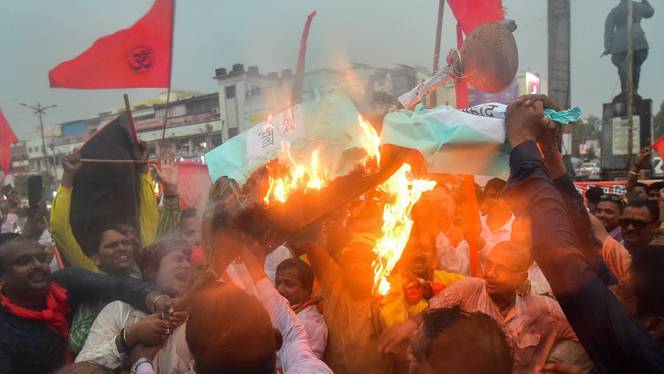Hindus and Muslims have clashed in the Indian state of Haryana a week after violence erupted during a Hindu procession in a Muslim neighborhood, with a tomb and several vehicles torched and shops ransacked, according to police.
The violence has been spreading with the latest beginning on Sunday and continuing into early Monday when several people set fire to a Muslim tomb, police officials said.
No one was hurt, they said.
At least seven people have been killed in the confrontations, including the cleric of a mosque set on fire last week in the district of Gurugram, police said on Monday.
The unrest began during a religious procession by Hindus in the Muslim-dominated Nuh district last week on Monday.
The violence spread to neighboring Gurugram the same night and continued through the next day, with a mosque being set on fire and its cleric killed, and several shops and eateries being vandalized or torched.
Tension between members of India’s Hindu and Muslim communities has periodically flared into deadly violence for generations.
The latest trouble comes as some members of the Muslim minority say they are unfairly treated by the government of the Hindu nationalist Bharatiya Janata Party (BJP), led by Prime Minister Narendra Modi. The government rejects the accusations.
Modi’s silence
Modi is the first to showcase incidents or projects that reflect India’s rising prowess, but critics and analysts say he is often deliberately mute on controversies— such as the COVID-19 Delta surge across India or acts of communal violence.
“I think everybody is very puzzled by the prime minister’s silence,” said Arati R. Jerath, an independent journalist and political commentator.
Last week, a railway police officer opened fire inside a train, killing a senior officer and three Muslims before hailing Modi, according to a purported video of the attack. Police are investigating the incident.
“The prime minister believes that silence on these issues does not harm him. He believes that he is reaching out to the people of India through the work that his government is doing,” Jerath said.
Some observers say that his silence could shield his political brand ahead of a general election next year, especially since Modi is more popular than the BJP. But Jerath said the conflict has now become too consequential to ignore.
“It is harming the prime minister because he comes across as somebody who doesn’t have empathy … and that’s not a good image” especially with India set to welcome leaders of the top 20 economies for a summit next month, she said.

The no-confidence motion in Parliament stems from concerns about Modi’s involvement, or the lack thereof.
The danger of violence and distrust between communities also remains high in Manipur, which has essentially been split into two parts.
More than 150 people have died, and over 50,000 were displaced after ethnic clashes in Manipur erupted in early May.
The internet was blocked for over two months, and movement for residents remains severely restricted.
Furious and armed mobs have torched homes and buildings, massacred civilians and driven tens of thousands from their homes.
There’s also growing fear that the turmoil in Manipur could potentially spread across India’s northeast, a region with a fractured history of ethnic violence that previous governments have long tried to resolve.

